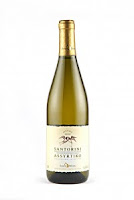As the second post of these blog but essentially the first I will write my opinion about Greek wines I have tasted until now. I must clarify that I'm no wine expert or wine qualified critic-tester and so, which means my opinion about wines is subjective and may not be correct for some of you but it is an opinion after all that you can read if you haven't tasted the particular wines.
Let's start, first of all let's see what some terms like "Assyrtiko", "Roditis" and more means when it comes to wine knowledge. After a research to many great sites about wine I found what those terms represent and I present them to you (many thanks to the wine bloggers-lovers):
Assyrtiko is one of Greece’s best white grapes. It exhibits clean crisp aromas and flavors with notable acidity and light minerality. A reasonably hearty grape and prolific in the vineyard, Assyrtiko is originally grown on the island of Santorin, but it is also grown in Macedonia and other locations. The variety is usually fermented in stainless steel and sees no oak, but some producers are keeping it on the lees while others are fermenting it in oak and blending it with other varieties. There are also sun-dried versions of the grape that are quite enticing.
Roditis is widely cultivated throughout Greece and one of the oldest indigenous varieties. It is a vigorous and high yielding grape that often produces innocuous wines. Different clones and cooler growing conditions can produce Roditis wines of greater interest and there are some in Macedonia.
Malagousia is a rare grape variety which has been nurtured by winemaker, Evangelos Gerovassilious. The grape is grown throughout Macedonia and elsewhere in Greece. Malagousia displays lovely aromas and flavors of stone fruit.
Xinomavro is a traditional red grape variety. It is ripens late and is not easy to grow. It has tight clusters and is susceptible to uneven ripening requiring careful selection of fruit before fermentation. Some vignerons consider Xinomavro to be like Barolo or Barbaresco because of it medium ruby color and tannins. Xinomavro is high in tannins and most of the wines show lots of tannic grip. Aging can help moderate tannins, but old ones also have it. Taming tannins best accomplished in the vineyard, but it would seem that extensive skin contact during fermentation would also be a contributing factor.
Agiorgitiko is perhaps the best known of Greece’s indigenous red varieties. It is generally medium-dark ruby colored and displays spicy red fruit aromas and flavors. It has an affinity with oak, generally late ripening, not overly tannic, and is easy to drink. It is vinified in a variety of styles throughout Nemea, Attica and Peleponnese.
Yeah, I know it's like school, theory and practical value are related but not as close as we would like. So here it comes, my opinion that is. I tasted "Nico Lazaridi Magic Mountain Red Dry Wine" and "Santo Wines Assyrtiko Dry White Wine".
The first was the best red wine I have ever tasted until now with a dark red colour and a smell of fruits of the forest, it really positively amazed me. The Assyrtiko on the other hand is a white wine with a smells of lemon zest. Bright and quite refreshing. An excellent choice as a bartender could suggest! And those where just 2 out of many possible choices when it comes to Greek wines. I believe in time I will get my hands more of them and then I will spend some time posting something even more detailed about them.



